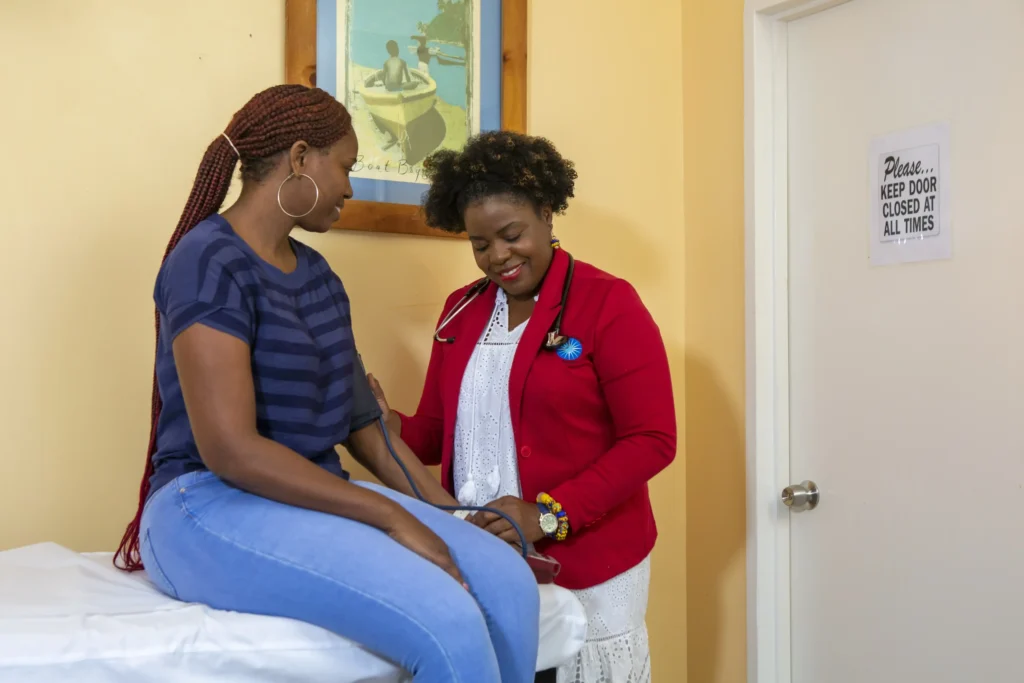At Crossroads Antigua, we understand the complexities of cocaine addiction
Our experienced team of professionals provides comprehensive care, addressing the physical, emotional, and spiritual aspects of addiction. Through counselling, education, and evidence-based therapies such as individual and group therapy, trauma therapy, and mindfulness-based relapse prevention, we empower you to navigate the challenges of addiction and develop healthy coping mechanisms.
Complementary therapies, including nutritional counselling, yoga, and art therapy, enhance your overall well-being. With our individualized approach and compassionate support, we are committed to guiding you on your path to lasting recovery.
Take the first step towards lasting recovery at Crossroads Antigua by contacting us today.
“I highly recommend the programs at Crossroads to anyone who is serious about overcoming addiction and turning their life around.”

What You Can Expect
If you’re battling an addiction to cocaine, know you are not alone.
Cocaine is a powerful stimulant drug. Continued use can cause you harmful physical, emotional, financial, interpersonal and social consequences.

Cocaine Detox Services
You are admitted for cocaine addiction treatment based on the suitability of needs.
Your treatment program may begin with medically supervised detoxification. During this process, our nursing and medical team provides 24/7 support.
Through ongoing evaluations, we’re able to customize a detoxification plan to meet your needs and manage your withdrawal symptoms to minimize your discomfort.
Counseling
Counseling begins from day one with assessments of your overall health:
- physical
- nutritional
- psychiatric
- spiritual
- social functioning
Education on the disease of addiction is an integral part of substance abuse treatment. You will be learning about the necessary steps that must be taken to discover your potential to create an optimal life through 12-step abstinence-based recovery. The 12 steps encourage self-examination through education, support, and accountability. Insight-oriented therapy both group and individual sessions help you gain a new perspective. A very low staff to patient ratio allows for more individualized care and attention.
Our Therapies Include:
- Individual and Group Therapy
- Trauma Therapy
- Experiential Therapy
- Mindfulness-Based Relapse Prevention
- Cognitive Behavioral Therapy
- Seaside Therapy Sessions
- Eye Movement Desensitization and Reprocessing (EMDR)

Complementary Therapies
Combined with our programs, we offer you complementary therapies to improve the overall quality of life while promoting physical and emotional health.
Complimentary therapies include:
- nutritional counseling
- recreational therapy
- yoga
- acupuncture
- spiritual integration
- fitness training
- massage therapy
- art therapy
- beach outings
- attendance to outside meetings
Continuing Care
Continuing care starts right at the beginning of treatment. Through a collaborative approach with you, the treatment team and alumni services, your needs are assessed.
Our team will help you develop a plan that may include:
- sober living options
- continuing care groups
- sober coaching
- sober companions
- individual therapy
- involvement in twelve-step support groups
Through our relationships with outside professionals, resources are identified for virtually any geographic location in which you intend to reside.
After you have completed our program, our Alumni Coordinator follows up with you on an ongoing basis and is available to provide guidance and assistance as specific issues arise following discharge.
“I highly recommend the programs at Crossroads to anyone who is serious about overcoming addiction and turning their life around.”
Cocaine Rehab FAQ
How to help a loved one with Cocaine Addiction?
- Educate yourself about addiction.
- Encourage open communication and provide a non-judgmental space.
- Express concern, empathy, and support.
- Encourage professional help and assist in finding treatment options.
- Offer practical support with logistics and appointments.
- Set boundaries to protect your well-being.
- Seek support for yourself.
- Encourage healthy lifestyle choices.
- Remember, your role is to provide support and resources while recognizing that recovery is ultimately their decision.
How long does Cocaine rehab typically last?
The duration of cocaine rehab varies, but it typically ranges from 30 days to several months. Short-term programs last around 30 days and provide intensive detoxification and initial treatment. Longer-term programs, lasting 60 to 90 days, offer more comprehensive therapy, skill-building, and relapse prevention strategies. The duration of rehab should be tailored to meet individual needs for sustained recovery, which may involve ongoing outpatient therapy and support groups.
Will my insurance cover the cost of Cocaine rehab?
At Crossroads Antigua, we want to inform you that we do not accept insurance for the cost of cocaine rehab. We understand that navigating the financial aspects of treatment can be challenging, and we are here to help. Our admissions team can provide you with detailed information on the cost of treatment and guide you through available payment options. We can also explore any potential financial assistance programs that may be applicable to your situation
What are the signs of Cocaine Addiction?
- Behavioural Signs:
- Increased secrecy and lying about activities or whereabouts
- Drastic changes in social circle and spending time with new, unfamiliar people
- Unexplained financial problems and frequent borrowing of money
- Neglecting responsibilities at work, school, or home
- Engaging in risky behaviour and taking unnecessary risks
- Physical Signs:
- Dilated pupils and bloodshot eyes
- Sudden weight loss and decreased appetite
- Nosebleeds and frequent runny nose (from snorting cocaine)
- Track marks or scarring on arms (from injecting cocaine)
- Changes in sleep patterns, such as insomnia or irregular sleep
- Psychological Signs:
- Intense mood swings and irritability
- Increased anxiety, paranoia, and restlessness
- Heightened agitation or aggression
- Poor judgment and impulsivity
- Decreased motivation and loss of interest in previously enjoyed activities
What are the risks of not getting treatment for Cocaine addiction?
Not seeking treatment for cocaine addiction poses significant risks to physical and mental health, finances, relationships, and the overall escalation of addiction. The health consequences of untreated cocaine addiction, such as cardiovascular problems and respiratory issues, can be severe and detrimental.
Financial strain and potential legal implications of not addressing the addiction can lead to additional hardships and challenges. Untreated addiction strains relationships, causing conflicts, breakdowns in trust, and a loss of support systems vital for recovery.
Moreover, it can contribute to the decline of mental health, exacerbating conditions like depression and anxiety. Seeking timely and comprehensive treatment for cocaine addiction is crucial to mitigating these risks, restoring well-being, and building a brighter future.
How Addictive is Cocaine?
Cocaine is highly addictive due to its impact on the brain’s reward system and the release of dopamine, which creates intense feelings of pleasure and reinforces drug use. Continued use leads to tolerance, dependence, and strong cravings, making it challenging to quit without professional help. The addictive nature of cocaine is characterised by intense cravings and withdrawal symptoms during cessation attempts.
How Cocaine Addiction Impacts Your Health
Cocaine addiction can have significant and wide-ranging effects on your health, both in the short term and long term. It is important to understand these impacts to fully grasp the risks associated with cocaine abuse.
Short-Term Effects of Cocaine Addiction
In the short term, cocaine use can lead to immediate physical and psychological consequences. Cocaine elevates heart rate, increases blood pressure, and constricts blood vessels, putting immense strain on the cardiovascular system. This cardiovascular strain can lead to elevated heart rate, increased blood pressure, and potential cardiovascular issues. Psychologically, cocaine use induces intense euphoria, heightened energy, and a sense of alertness. However, it can also cause anxiety, paranoia, and respiratory problems. The short-term effects of cocaine use also include an increased risk of engaging in risky behaviour and accidents due to impaired judgment and increased impulsivity.
Long-Term Effects of Cocaine Addiction
Long-term cocaine addiction can lead to severe health complications and ongoing issues. Chronic cocaine use is associated with an increased risk of cardiovascular complications, including heart attacks, strokes, and heart disease. It can also result in respiratory complications such as chronic cough, respiratory infections, and lung damage. Mental health disorders are commonly associated with cocaine addiction, including depression, anxiety disorders, and psychosis.
Cocaine Rehab – Overcome Cocaine Addiction with Crossroads Antigua
Recovering from cocaine addiction can be an incredibly challenging journey, but at Crossroads Antigua, we are here to support you every step of the way.
Take the important step towards healing and call us today to learn more about our cocaine rehab program and start your journey to a brighter future. Our compassionate team is ready to provide guidance, answer your questions, and help you embark on the journey towards a brighter and addiction-free future.
Start Your Recovery with Crossroads Today
Our admissions team is ready and standing by 24/7. Don’t hesitate any longer.
